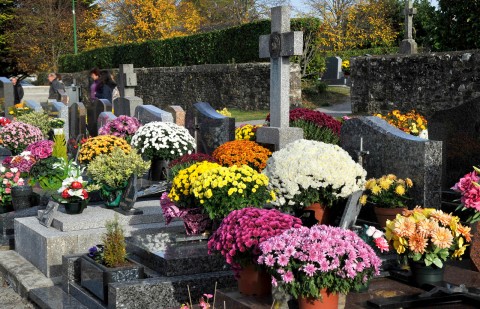NEWS
The History and Significance of Funeral Flowers Across Cultures

Introduction
Throughout history, humanity has sought solace in the midst of grief through various customs and rituals. One such profound tradition involves the use of funeral flowers. A universal expression of respect, love, and mourning, these floral tributes bridge cultural divides, communicating sentiments when words often fall short.
A Timeless Tradition: The Ancient Roots of Funeral Flowers
The tradition of integrating flowers into burial rites isn’t new. Ancient Egyptians adorned tombs with floral arrangements, believing these blooms assisted souls in their afterlife journey. The Greeks used flowers and herbs to honor athletes and warriors, later integrating these practices into their burial customs. Romans, with their elaborate funeral processions, considered flowers essential to bid a proper farewell. Across these ancient civilizations, flowers were more than mere decorations; they were deeply symbolic, representing life’s fleeting nature and the hope for renewal.
The Symbolic Language of Funeral Flowers
Across the ages, flowers have been chosen for their symbolic meanings:
- Lilies: Beyond their association with purity, they also symbolize the transitory nature of life.
- Roses: A red rose stands for love and respect, while a white one denotes innocence and youth. A yellow rose, often less common at funerals, represents strong bonds of friendship.
- Carnations: These have different meanings based on their colors. While red speaks of deep love and admiration, white is often associated with pure love and innocence.
- Orchids: Universally, orchids symbolize eternal love. Their enduring bloom cycle makes them a poignant choice for funerals.
Funeral Floral Arrangements Across the World
Cultural nuances significantly influence funeral flower choices:
- Asia: Beyond the white chrysanthemums, lotus flowers, representing purity and spiritual elevation, are favored in Buddhist ceremonies.
- Europe: In addition to lilies, tulips and hyacinths, especially in Eastern Europe, are common funeral flowers, symbolizing eternal love and prayer.
- Africa: Floral arrangements here are vibrant, echoing the continent’s rich traditions and colors. They often symbolize celebrating a life well-lived rather than mourning a loss.
London: A Melting Pot of Funeral Flower Traditions
London’s cultural diversity is reflected in its funeral customs. Walk into any funeral in this historic city, and you might find a blend of traditions. The white chrysanthemums of Asia might be placed alongside European lilies. Such amalgamations not only honour the deceased’s heritage but also celebrate London’s multicultural fabric.
Flower Station: Navigating Cultural Sensitivities
In a city as diverse as London, choosing the right funeral flowers can be daunting. Enter Flower Station. Their team, well-versed in various cultural nuances, crafts arrangements that are both beautiful and respectful. They understand that in times of grief, the right flowers can offer immense comfort. Their expertise ensures that the chosen floral tributes are not just appropriate but also resonate deeply with the bereaved.
Embracing Modernity While Honouring Traditions
Modern funeral customs have evolved, with many families opting for non-traditional arrangements that reflect the deceased’s personality and passions. From bouquets featuring the favourite flowers of the departed to arrangements reflecting their hobbies, the focus is shifting towards personalization. However, even in these modern interpretations, the essence of traditional funeral flowers remains intact. They still stand as symbols of love, respect, and the cycle of life and death.
Conclusion
Funeral flowers, with their silent eloquence, have stood the test of time. From ancient civilizations to modern metropolises like London, they remain a poignant expression of our shared human experience of love, loss, and remembrance. As traditions evolve and cultures merge, the essence of funeral flowers, representing our deepest emotions, remains unchanged. They remind us of the beauty of life, its fragility, and the eternal cycle of existence.










